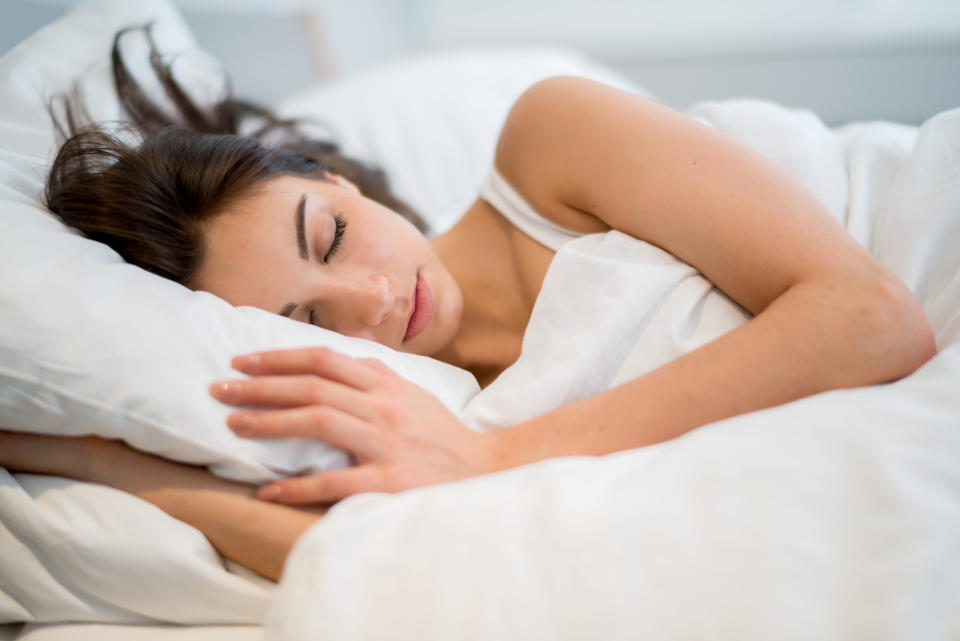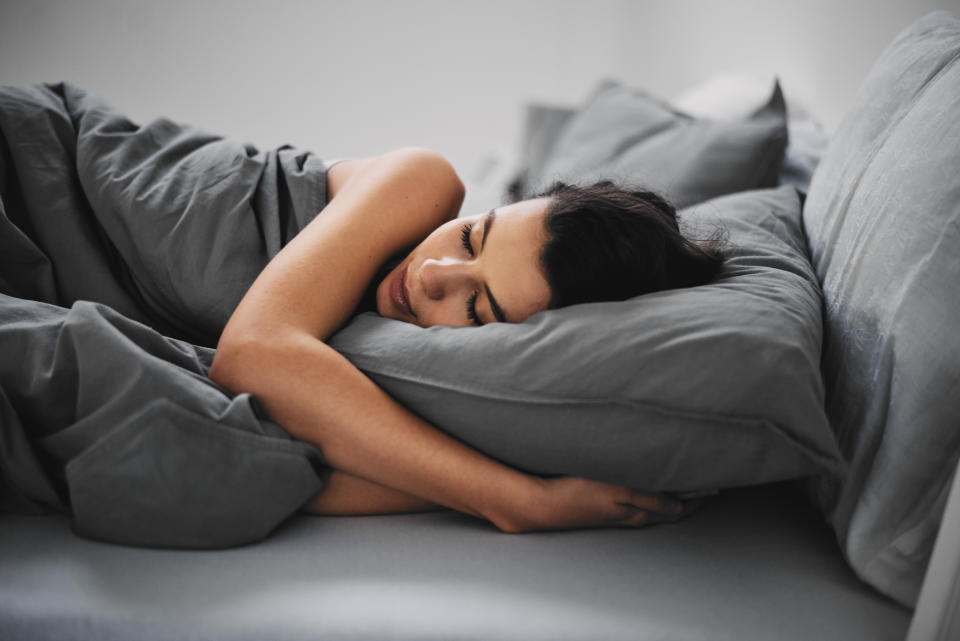What losing just ONE hour of sleep can do to your body
Do you feel a little sluggish and tired after waking up earlier than normal? Whether you’re racing to catch a flight at the crack of dawn or simply adjusting to daylight savings, it turns out that even a single hour of lost sleep can actually have quite an effect on your body.
Research has shown that losing an hour of sleep may cause increased appetite – something like 200 more calories the day after the change kicks in – as well as reduced exercise endurance and decreased productivity.
That’s something that social scientist and biologist Silvia Damiano sees all the time in her clients.
“What I see in my clients is that when the minimum of seven hours (although some need eight or nine), and as such the five stages of sleep, are not completed, it may translate into feelings of tiredness in the morning and being less sharp and ready to meet the challenges of the day,” Silvia, founder of the About My Brain Institute, tells Yahoo Lifestyle.

“They may not be energised and happy about what they need to do and when they arrive at work they do not have the optimal mood necessary to influence and lead others towards achieving the best results.”
While the change around daylight savings is small, it does enough to impact your circadian rhythm and disrupt your internal clock.
“The basic principle is that our internal body clocks are synchronised to light,” Dr Peter Eastwood, President of the Australasian Sleep Association and Professor at the University of Western Australia, tells Yahoo Lifestyle.
“Light is the biggest stimulus to keep our body clock online. So if all of a sudden you change the clock outside of that and the timing between light and dark, sleep and wake changes, your body needs time to adjust.”
Thanks to circadian rhythms, the body begins secreting melatonin, a sleep-promoting hormone, around 9 pm, with levels dropping way off by the next morning, explains Dr Cathy Goldstein, an assistant professor of neurology at the University of Michigan School of Medicine Sleep Disorders Center.
“You take somebody who’s very sleepy when they get up at 6 am, and then they get up at 6 am during Daylight Saving Time, and for them, that’s physiologically 5 am,” Cathy told Time magazine.
“That’s a big problem because you’re waking up at a time when the circadian system is not yet promoting alertness. It’s still pushing for that sleepiness.”

What’s even more scary, that lost hour of sleep could play a bigger, perhaps more dangerous role in our body’s natural rhythm, according to a study led by the University of Michigan Frankel Cardiovascular Center.
The shocking results of the research showed that switching over to daylight saving time, and subsequently losing one hour of sleep, actually increased the risk of having a heart attack the following day by 24 percent.
Many studies of shift workers, whose nighttime sleep is often disrupted, have also identified health problems associated with chronic sleep deprivation, including heightened risks of obesity, cardiovascular disease and even cancer.
“The concerns are much more with chronic under-sleeping. Every time you have to change shift, for example, you’re changing your body clock by many hours, and you’re chronically sleep-depriving yourself because you’re constantly trying to sleep when your body thinks it should be awake,” Dr Eastwood tells us.
“We know this causes quite profound health consequences. And we know inadequate sleep is incredibly common in society.”
The economic cost of inadequate sleep in Australia in one year is a staggering $66billion, according to the Sleep Health Foundation.

Dr Eastwood however does stress that our bodies are very capable of dealing with that one hour shift, and the effect it generally has on the body is very small.
“If there is any affect on things like heart attacks and depression, and a few other studies that have shown changes in behaviour, physiology and mood, with a one hour shift, they are very small,” he says.
“For most people, the human body is capable of shifting an hour every day. A good example of that is switching time zones. Normally when we travel it takes us a couple of days for our body clock to adjust. But we do that regularly. So the chances of that one hour shift in the body clock having a major effect on your health is very small.”
The clock typically moves ahead in the spring, so that evenings have more daylight and mornings have less, and returns to standard time in autumn.
Daylight saving time was widely adopted during World War I to save energy, but some critics have questioned whether it really does so and whether it is still needed.

Some tips to reduce the impact of daylight savings
Experts from bedding manufacturer A.H. Beard have put together some tips on how to ensure daylight savings has a minimum impact possible on sleep quality.
Gradually adjust your bedtime by 10-15 minutes earlier over the next few days so your body will be ready when the clocks move forward. Red light increases levels of melatonin (the body’s natural sleep hormone) helping you to fall asleep more quickly.
Use ‘bright light’ to help manage your body clock, avoid bright light in the evening and expose yourself to sunlight in the morning.
Create a regular sleep schedule. Going to bed and waking up at the same time every day will help stabilise your circadian rhythm, so you will naturally become tired around the same time each night.
Use your bedroom only for sleep to strengthen the association between your bed and sleep. It may help to remove work materials, computers and televisions from your bedroom to help you wind down ready for sleep.
Create the ideal sleep environment. Keep your room between 18 and 22◦C if possible, block out unwanted light and noise, and ensure you have a comfortable, supportive mattress and pillows.



Some of the links in this article may return revenue to Yahoo Lifestyle Australia.
Got a story tip or just want to get in touch? Email us at lifestyle.tips@verizonmedia.com
Want more lifestyle and celebrity news? Follow Yahoo Lifestyle on Facebook, Twitter and Instagram.

 Yahoo Lifestyle
Yahoo Lifestyle 



